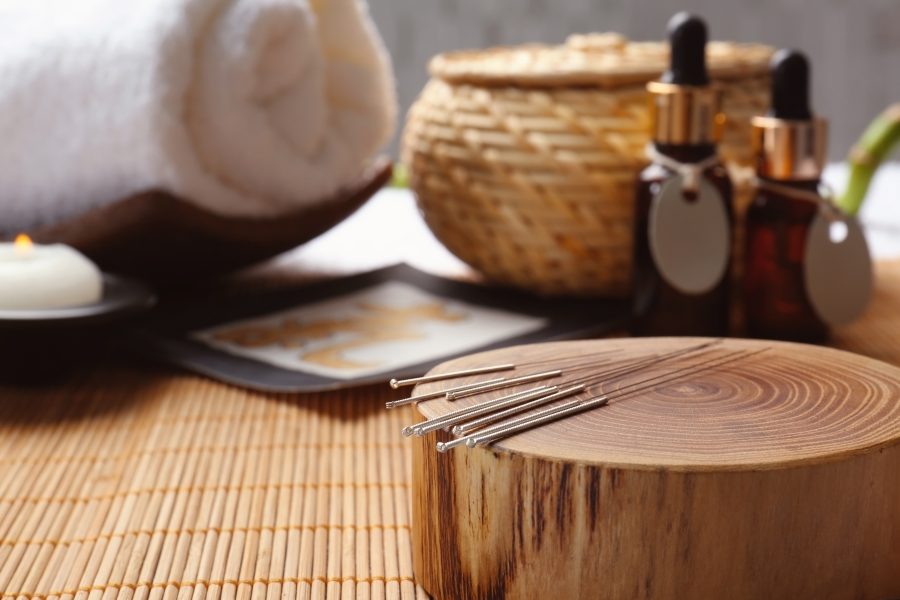Snail Mucin and Eczema
Snail mucin, that slimy secretion produced naturally by snails, is in all sorts of skincare products nowadays. Get the lowdown on this trending ingredient and how it might affect eczema.

Published On: Jun 3, 2019
Last Updated On: Jul 13, 2021
If a certified acupuncturist were to strategically insert tiny, hair-thin needles into the skin, would it help symptoms of eczema? Just like many of the other topics in our “Get the Facts” series, the answer to that question is a resounding … maybe?
Acupuncture is a technique in which practitioners stimulate specific points on the body called “acupoints” by inserting thin needles through the skin tissue. It’s used as an alternative or complementary treatment for many ailments, including chronic pain, nausea, anxiety and depression.
Acupuncture is a key component of traditional Chinese medicine (TCM), which is considered a pseudoscience among Western medicine practitioners. This means that the theories and practices of TCM are not based on medical knowledge and therefore cannot be scientifically proven.
TCM defines acupuncture as a technique for balancing the flow of energy or life force — known as chi or qi (chee) — believed to flow through pathways in the body. By inserting needles into specific points along these pathways, acupuncture practitioners believe that the energy flow will rebalance.
Western practitioners offer a more practical outlook, speculating that the acupoints cover target zones in the body that, when pricked by a needle, will stimulate nerves, muscles and connective tissue. When this stimulation occurs, the body’s natural painkillers are released.
There have been extensive studies conducted on acupuncture, especially for back and neck pain, osteoarthritis and migraines. According to the National Center for Complementary and Integrative Health, research suggests that acupuncture can help manage certain pain conditions.
Only recently have there been studies conducted specifically on acupuncture and atopic dermatitis (AD). According to the results of a randomized, 30-person study published in the December 2018 issue of Complementary Therapies in Medicine, acupuncture was found to improve symptoms of mild to moderate AD, particularly in controlling pruritus (itch).
Results of a similar study published in the July 2018 issue of the International Journal of Allergy Medications saw a reduction in itch, lesion size and recurrence in the acupuncture group compared to the control group. The study’s authors went on to say that acupuncture was valuable in the treatment of AD “by virtue of the fact that it can reduce a patient’s level of stress.”
The risks of acupuncture are low as long as you have a competent, certified acupuncture practitioner using sterile needles.
Common side effects include soreness and minor bleeding or bruising where the needles were inserted. Single-use, disposable needles are now the practice standard, so the risk of infection is minimal.
Not everyone is a good candidate for acupuncture. You may be at risk of complications if:
It’s important to remember that there is no be-all and end-all treatment for eczema. Some therapies might work for some eczema patients but could trigger a flare or allergic response in other eczema patients.
Tell your doctor if you’re considering acupuncture. They may offer their opinion on the effectiveness or safety of this treatment based on your unique health profile. Some doctors might even refer you to a trusted acupuncturist.
When you do find a practitioner, check their credentials. Most states require non-physician acupuncturists to pass an exam conducted by the National Certification Commission for Acupuncture and Oriental Medicine.
Before the session, ask the acupuncturist what’s involved in the treatment and how much it will cost. Some insurance providers cover acupuncture in their healthcare plans. Also ask the acupuncturist whether they’ve practiced acupuncture on eczema patients before. Let them know whether you are experiencing a flare. They may not feel comfortable puncturing areas of the skin directly affected by eczema rash.
Curiously, acupuncture doesn’t work on everyone regardless of the ailment it’s supposed to be treating. There are some people who experience noticeable changes in their bodies during or after an acupuncture session. Others have said they felt no difference at all.
Will acupuncture work for you? Maybe. Is it worth a try? That’s entirely up to you and your doctor to decide.
https://nationaleczema.org/traditional-chinese-medicine-and-eczema/